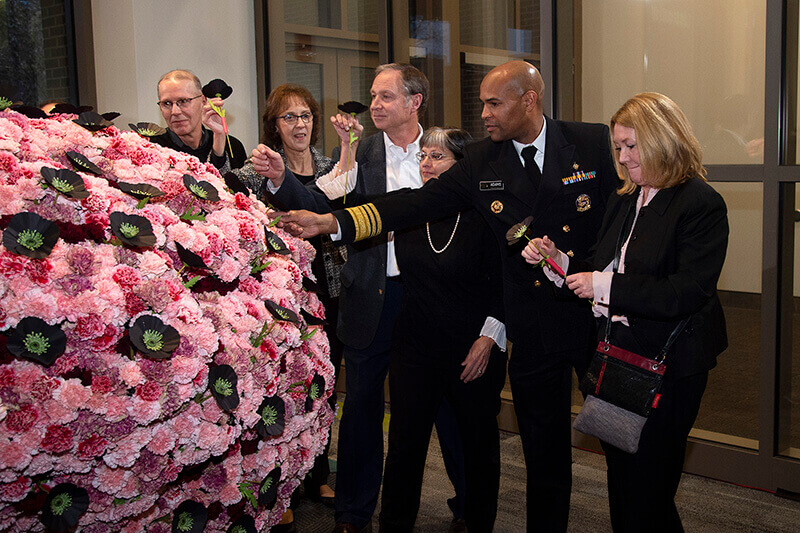November 19, 2019
‘Hope Stems’ blooms at Purdue, raising awareness on addictions, substance use

VADM Jerome M. Adams, U.S. surgeon general (second from right), joins three families who have lost family members from substance use during the unveiling of the "Hope Stems" Brain Flower sculpture on Nov. 18 at Wilmeth Active Learning Center. (Purdue University photo/Mark Simons)
U.S. Surgeon General Jerome M. Adams speaks at event
WEST LAFAYETTE, Ind. — Each day, 130 Americans die from opioid use.
By using a giant floral brain symbolizing the effect opioids has on one’s body, a group of Purdue University faculty, staff and students are working to break the stigma of addictions and substance use.
“Hope Stems,” originally developed by Shatterproof and McCann Health NYC, will be the focal point of discussion on the opioid epidemic from Nov. 18-21 at Purdue University’s Wilmeth Active Learning Center.
VADM Jerome M. Adams, U.S. surgeon general, spoke during the project’s unveiling Monday (Nov. 18) in the learning center’s Hiler Theater. Dr. Adams presented “The Road to Recovery: Combating the Opioid Crisis.” He then took part in a Q&A with Purdue students moderated by Eric Barker, dean of the College of Pharmacy.
Adams previously served as health commissioner for the Indiana State Department of Health from 2014-17, where he worked with state and county public health and elected officials to address the opioid epidemic, especially in southern Indiana’s Scott County.
Hope Stems is a large sculpture in the shape of a brain that is made out of 9,000 pink carnations and 300 black poppies. The black poppies symbolize the opioids’ damage to the brain.
Volunteers from student organizations began placing the flowers in the structure on Saturday (Nov. 16) at Wilmeth. Depending on the number of volunteers, it can take up to two days to install the flowers.
This is the second installation of Hope Stems Brain Flower. The first installation was in Herald Square in New York City in April.
Barker said it is important to bring many people together from across disciplines to not only talk, but also find solutions to this public health issue.
“We are excited to partner with so many colleges and departments from across Purdue as well as the community to talk about breaking the stigma that is associated with opioid and substance use,” Barker said. “Many faculty and students are working with community organizations, including industries, health care, government and law enforcement in developing programs and solutions in a variety of settings. The Brain Flower is meant to be a memorable and visible symbol for the hope of recovery and restored life.”
Cathy Scott, program manager of BoilerWoRx, a program offered by the College of Pharmacy, and a member of the Regenstrief Center for Healthcare Engineering, is one of the coordinators of the event.
In addition to the floral brain, there will be four information areas around campus with QR codes connecting to information about opioids and about personal stories of families affected by opioid use, recovery and naloxone training. There also will be three sessions for naloxone training: 4:30 p.m. today (Nov. 19); and 2:30 p.m. and 3:45 p.m. on Wednesday (Nov. 20). The training will be in Robert Heine Pharmacy Building, Room 172. Limited space is available, and RSVPs are required.
“Being the second installation, it moves the recognition and conversation to the Midwest. It also signifies the importance of a university community and its value and input as problem-solvers for this public health initiative,” Scott said. “This will touch lives that we will never know about. We don’t know who that next person is.”
Walmart is a corporate sponsor of the Hope Stems installation at Purdue, valuing the importance of training, education and awareness in the recovery of communities facing the opioid epidemic.
“Working with Purdue University and others to collaborate on solutions is crucial to solving this public health issue. We are proud to be part of the collective voice to raise awareness in this unique and informational initiative,” said Warren Moore, vice president, Neighborhood Market Pharmacy for Walmart U.S. Health and Wellness and a 2002 Purdue graduate.
Writer: Matthew Oates, 765-496-2571, cell 765-586-7496, oatesw@purdue.edu, @mo_oates
Sources: Cathy Scott, 765-496-2001, Catherine-Scott@purdue.edu
Maria Munoz, 765-496-0525, cell 765-491-0069, munoz28@purdue.edu
Note to journalists: Any journalist interested in covering the surgeon general’s visit, please contact Matthew Oates, Purdue News Service, at oatesw@purdue.edu.
Related Web site
Web video series aims to help educate community about opioids, substance abuse and resources

